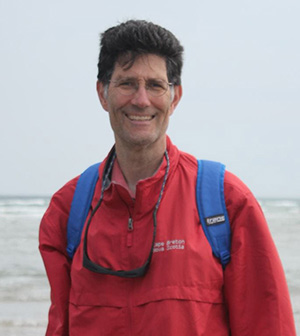Campus News
California Sea Grant funds graduate research fellows at UCSC
California Sea Grant has awarded funding to four UC Santa Cruz graduate students for marine science research projects that address the agency’s priority themes of resilient coastal communities and economies, sustainable fisheries, and healthy coastal ecosystems.




California Sea Grant has awarded funding to four UC Santa Cruz graduate students for marine science research projects that address the agency’s priority themes of resilient coastal communities and economies, sustainable fisheries, and healthy coastal ecosystems.
The UCSC graduate research fellows are taking novel approaches to answer diverse and important questions for California’s coastal communities and ecosystems, from the effects of wildfires on endangered salmon to the effects of sea level rise on critical infrastructure in socioeconomically disadvantaged San Francisco Bay regions.
Genevieve Pugsley, an ocean sciences graduate student working with Professor of Ocean Sciences Matthew McCarthy, won funding for a project to study how marine phytoplankton communities in coastal California change with shifting climate. Climate variation affects the structure and productivity of coastal ecosystems, as well as the risk of dangerous and costly harmful algal blooms. Despite the need for knowledge about likely effects of changing climate on coastal ecosystem productivity and health, scientific understanding is limited by the relatively short duration of recent ecological monitoring efforts.
Pugsley’s research team is turning to paleoclimate records stored in deep sea coral skeletons and sediments. The aim is to adapt and validate an innovative new isotope ecology method for quantifying phytoplankton community changes in coastal marine environments, and then apply this isotope fingerprinting method to gain new insight into the influence of past climate change on phytoplankton community composition and algal bloom occurrence in central California.
Katie Kobayashi, a Ph.D. candidate in ecology and evolutionary biology (EEB) working with EEB Professor Eric Palkovacs, is investigating the effects of wildfires on imperiled populations of salmon and steelhead. With climate change, the frequency and intensity of wildfires are increasing, which may significantly alter physical and ecological processes in stream ecosystems. Kobayashi’s project leverages data from a heavily-monitored watershed affected by a recent California wildfire to assess the consequences of fire for endangered coho salmon and threatened steelhead trout.
In collaboration with NOAA’s Scott Creek Salmonid Research and Monitoring Program, Kobayashi will explore whether fire will tip the balance between the energetic demands of salmonids and the amount of food supplied by the food web. Through its effects on physical habitat, wildfire could simultaneously impact both metabolic demand and food availability for young fish. If increased metabolic demand is accompanied by decreased food availability, then their growth and survival are threatened via a mechanism called “metabolic meltdown.”
Julia Cheresh, a Ph.D. student advised by Associate Professor of Ocean Sciences Jerome Fiechter, won funding for her research on ocean acidification and hypoxia (low oxygen) in the California Current System. Ocean acidification and global oxygen decline are among the most concerning climate change-related threats to marine life. Their impacts are particularly pronounced in the California Current System due to natural exposure to lower pH and oxygen conditions during seasonal coastal upwelling.
Cheresh’s project will use global climate projections to characterize the 21st century progression of ocean acidification and hypoxia in the California Current, which is home to highly productive and biodiverse ecosystems with significant ecological, economic, and cultural importance. Projections and analyses will be used to develop an interactive web tool tailored toward the needs of resource managers.
James Jacobs, a Ph.D. student in Earth and planetary sciences, is working with research scientist Adina Paytan to study the effects of sea level rise on critical wastewater and transit infrastructure in two low-income residential developments on the margin of San Francisco Bay. Flooding of wastewater infrastructure will increase with sea level rise, damaging pipes and pumps and causing sanitary sewer overflows and pipe backflows, all of which create human health exposure risks and environmental damage. Regular flooding of roads causes delays and damages transit infrastructure.
Jacobs’ team will study two areas developed on the San Francisco Bay margin that have higher flood frequencies than similar nearby communities. These locations also reflect the intersection of socioeconomically disadvantaged areas with high flood vulnerability and critical wastewater and transit infrastructure that may be disproportionately impacted by sea level rise. Jacobs will collect field data to identify groundwater flooding, sewer overflows, and road flooding to better understand the short-term impacts. The team aims to provide real-time advance warnings to agencies and residents of impending sewer overflows and road flooding, as well as to identify sources of floodwaters.
California Sea Grant prioritizes supporting the next generation of early career scientists focusing on applied research. The four UCSC projects are among 12 graduate research fellowships awarded for 2022 to expand the number and diversity of researchers who can launch their scientific careers with Sea Grant support. The funded projects will help develop practical scientific results that will inform future management.